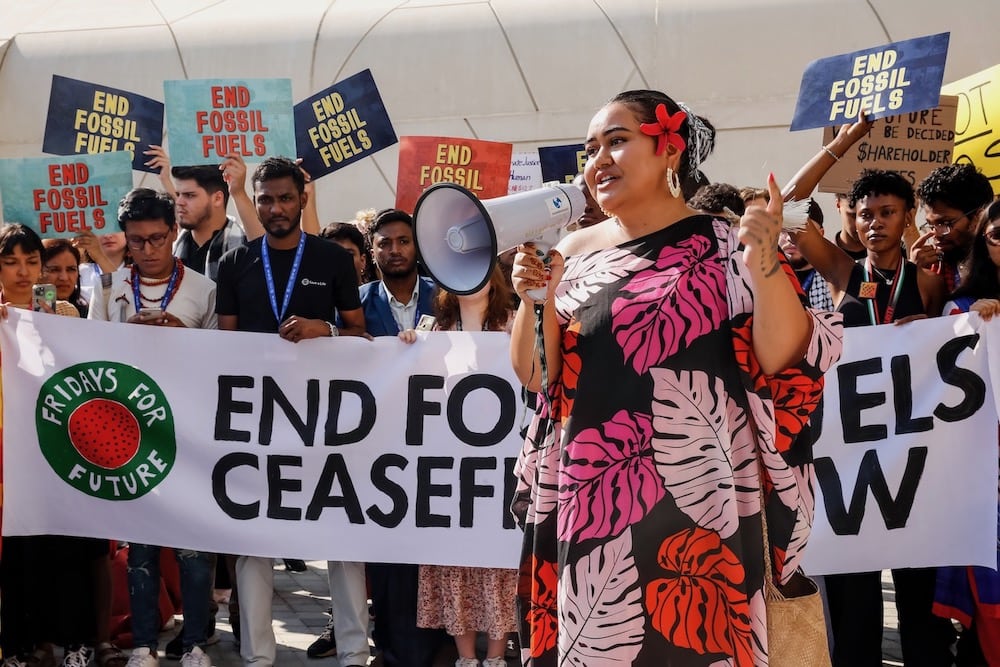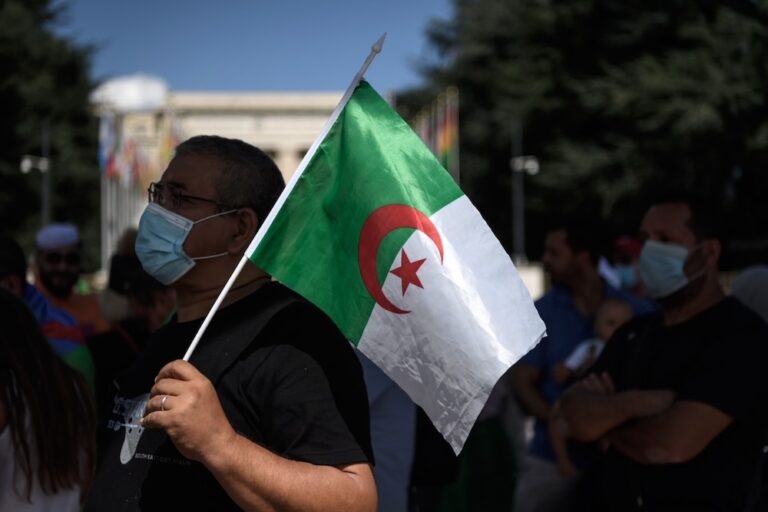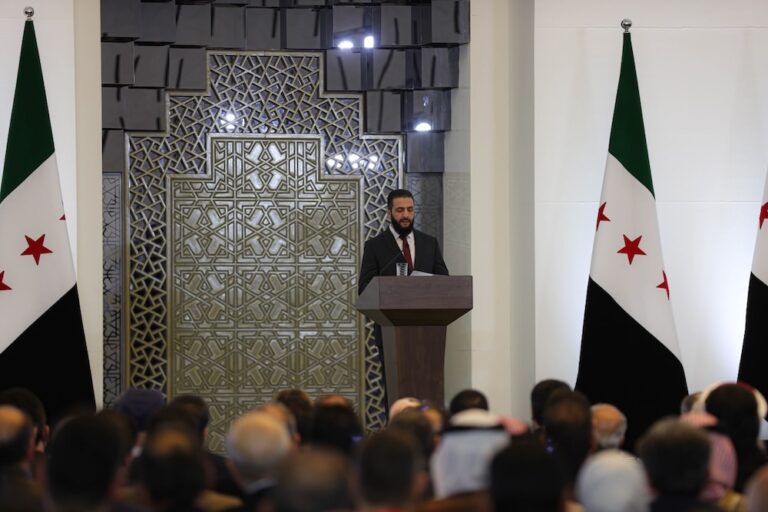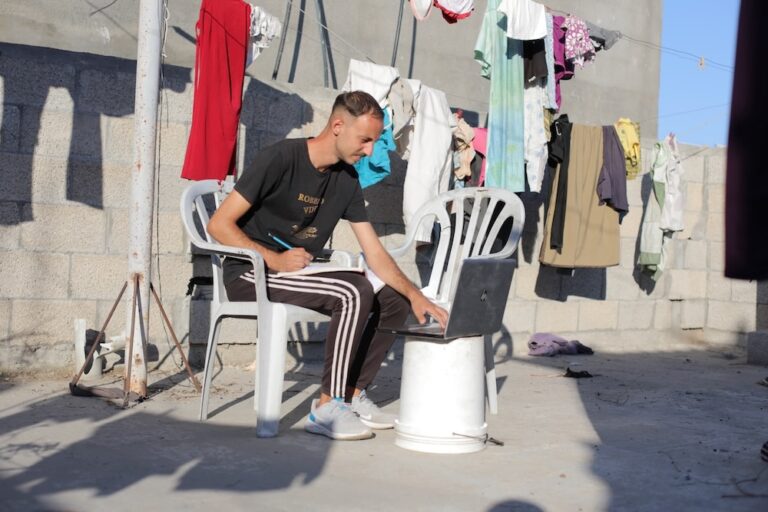"We believe it is essential for children to be integral participants in the decision-making processes regarding climate. The decisions made at these high-stakes discussions will dictate the future that we, as the younger generations, will inherit" - CRIN
Open letter from CRIN’s Climate Advisers to COP28 delegates
The words below come from CRIN’s Climate Advisers – ten individuals under 18 who advise CRIN on its work on children’s right to a safe, healthy and sustainable environment. Like CRIN, they believe the climate crisis is a children’s rights issue. COP 28 is a key opportunity to ensure that children’s rights are integrated in climate decisions – and that their voices are given the platform and respect that they deserve. We implore you to truly listen to and respond to children’s voices and perspectives – they have rights, they care and their passion and knowledge can push us all to make strong and rights-respecting decisions at this critical time.
8 December 2023
Esteemed guests and distinguished delegates of the 28th session of the Conference of the Parties,
We are ten passionate climate activists between the ages of 11 and 17 from Spain, Belgium, Colombia, Hong Kong, Austria, Trinidad and Tobago, Australia, Kenya, South Africa and Bosnia-Herzegovina. Many of us have been severely impacted by the climate crisis, with some even having lost loved ones in climate-related disasters. As Climate Advisers for the Child Rights International Network (CRIN), we are united by a common goal: ensuring that children worldwide live in a clean, healthy, and safe environment.
We aim to inspire a collective sense of responsibility and urgency, underscoring the universal truth that the fight against climate change knows no borders. Most of us have done so by reaching out to our governments or even starting our own local and international non-profits and initiatives, aiming to empower current generations to advocate for systemic change. But we also strongly believe that world leaders have a core responsibility to take these opinions into account, and make our rights and voices heard, given that we are the individuals at the forefront of the climate crisis.
An important step for children’s rights was taken last year at COP27 when parties agreed that countries should, when taking climate action, respect, promote and consider the rights of children, as well as the burden that their decisions will have on future generations. But what is a commitment without action? We need these commitments to translate into significant climate policy initiatives or investments.
Another essential step was taken in September by the United Nations Committee on the Rights of the Child when they launched General Comment 26 on children’s rights and the environment with a special focus on climate change. In this guidance document for States, the Committee highlights the urgent need to tackle environmental degradation and emphasises the challenges posed by climate change, on the fulfilment of children’s rights. It provides clarity on the responsibilities of States in that regard and confirms that children possess the right to live in an environment that is clean, healthy, and sustainable.
Today, as the world gathers for the “children and youth” day at COP28 in Dubai, with two of us Advisers being present in-person, we are raising our voices. We believe it is essential for children to be integral participants in the decision-making processes regarding climate, adaptation, mitigation, and discussions on loss and damage. The decisions made at these high-stakes discussions will dictate the future that we, as the younger generations, will inherit.
We bring unique perspectives, untainted by political agendas, and a genuine concern for the world. Including children in these crucial discussions is not just a symbolic gesture – it is an acknowledgment of our rights and a recognition of the intergenerational impact of climate decisions. We, as young climate advocates, possess a deep understanding of the urgency that climate change demands, as it is our future that hangs in the balance.
Young activists worldwide have succeeded in drawing global attention to the climate crisis. Rather than being disregarded, their passionate advocacy has sparked conversations, influenced policies, and catalysed positive collective action on an unprecedented scale. The tireless efforts of youth-led movements have played a crucial role in elevating climate change to the top of the global agenda.
We have three key asks for State Party delegates and the UNFCCC at COP28:
- Recognise the importance of incorporating children and youth into decision-making processes. While it is a positive step forward that since last year there is a “children and youth” pavilion at COP where children and young people have a designated space, we urge State Parties to take our voices into consideration at the highest level – around the negotiation tables.
- Allocate funds for the active participation of children in top level climate discussions. Financial support will ensure that young voices are heard and that their perspectives contribute meaningfully to shaping climate policies.
- Create child-friendly versions of COP decisions, to make it easier for children to partake in such important international climate events hosted by the UNFCCC. It is essential that children have access to age-appropriate versions of these decisions, so that children around the world, especially Indigenous communities, children from marginalised communities, child climate refugees, and those struck hardest by the effects of human-induced climate change are able to understand what has been decided at these climate forums and what it means for their futures.
By taking these steps, we will pave the way for a more inclusive and sustainable approach to addressing the climate crisis. Our future depends on the decisions made today, and we are here to actively participate in shaping those decisions.
Let us not forget the preamble of the 2015 Paris Agreement – to acknowledge that “climate change is a common concern of humankind, Parties should, when taking action to address climate change, respect, promote and consider their respective obligations on human rights, the right to health, the rights of Indigenous peoples, local communities, migrants, children, persons with disabilities and people in vulnerable situations and the right to development, as well as gender equality, empowerment of women and intergenerational equity”. Effective change stems from how these promises on paper, signed and ratified, are transformed into collective action.
Let the “children and youth” day at COP28 mark the beginning of a new era—one where the youngest among us play an integral role in forging a path toward a resilient, sustainable, and safe future for all.
Sincerely,
Beatriz, Spain
Ben, Belgium
Emmy, Kenya
Juan David, Colombia
Kate, HKSAR, China
Lars, Austria
Lithalomso, South Africa
Renatta, Trinidad and Tobago
Ruby, Australia
Tin, Bosnia and Herzegovina



